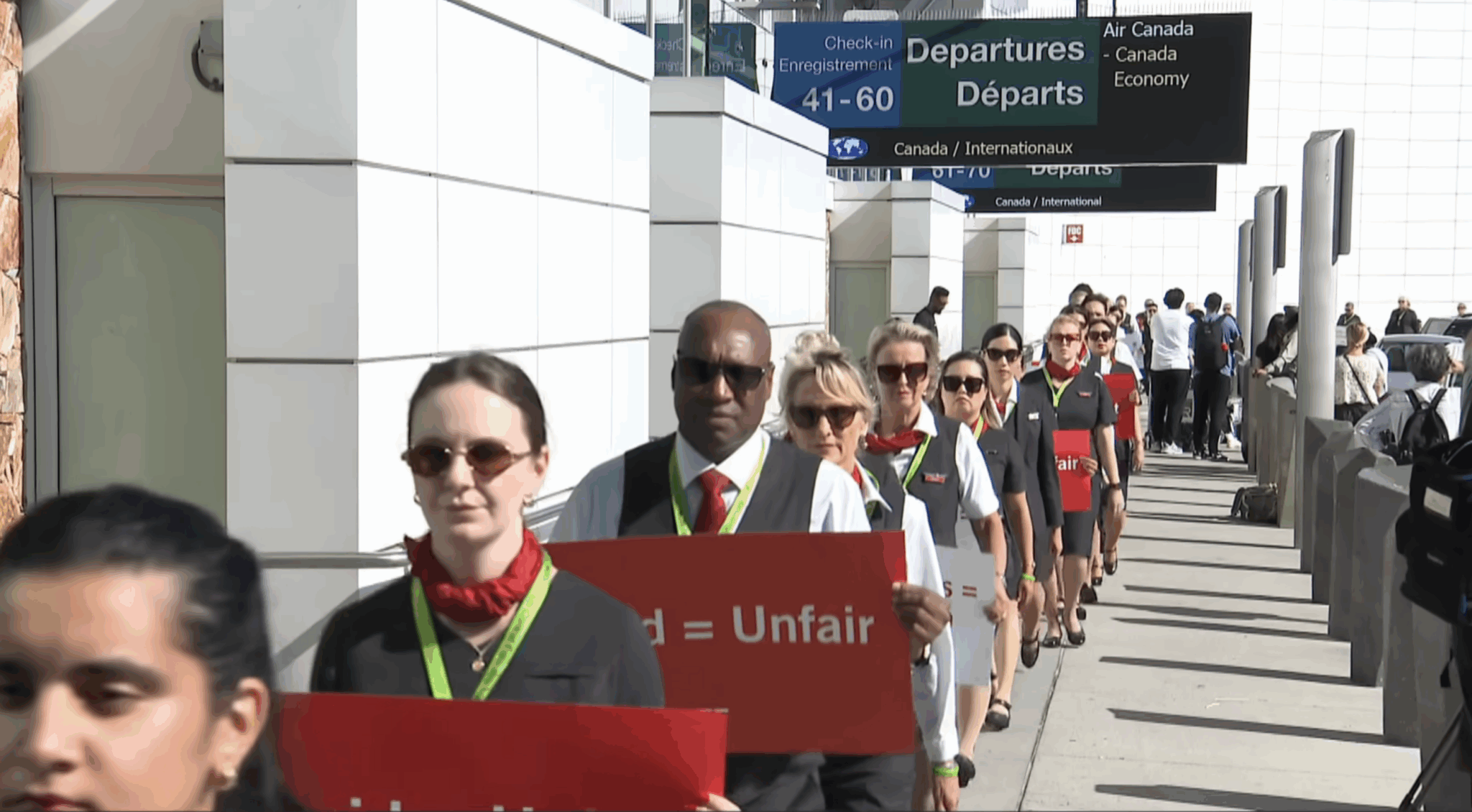‘The facts don’t justify supporting the flight attendants’: Why the Conservatives backing the Air Canada flight attendants could be a misplay
Rudyard Griffiths and Sean Speer discuss the Air Canada flight attendants’ strike and the political responses from Canada’s major parties. They debate whether the Conservative Party’s decision to support the striking workers over the Carney government’s back-to-work legislation represents smart politics or misguided strategy.
You can listen to this episode on Amazon, Apple, and Spotify.
Program Transcript
This is an automated transcript. Please check against delivery.
RUDYARD GRIFFITHS: It’s official. The Air Canada strike is illegal. The Federal Labor Board has ruled it. So what does this all mean for one of the biggest labor disruptions in recent memory? Thousands of Canadians stranded here in Canada and around the world. To help break it all down, I’m joined by Sean Spear, my co-founder and the Hub’s editor at large. Sean, your feet are safely on the ground. You are not in Brussels or Bonn. We are waiting on the flight that may never come.
SEAN SPEER: Yeah, I count myself lucky. Unlike an estimated 130,000 people who are affected each day that this strike goes on. There are so many different ways to think and talk about the strike and the reaction that we’ve seen from political commentators and others. But for me, Rudyard, one of the most significant developments in recent days has been the Conservative Party’s decision to effectively support the flight attendants and oppose the Carney government’s back to work legislation. It’s clearly part of a broader political trend that we’ve written and talked a lot about, the Hub known as the political realignment, the increasing shift of center right parties to be more representative of working class interests. In an article I have at the Hub, it’ll be posted shortly. I make the case that I think this is the wrong judgment on the part of the Canadian Conservatives that, well, their instinct to want to be responsive to and representative working class interests is generally good. The facts in this particular case, I don’t think justify the party coming out in support of the flight attendants.
RUDYARD GRIFFITHS: Well, let me offer the opposite point of view. I think this is politically. Get into the policy later, but I think politically it is smart. The reality is that Air Canada is a hated corporation. All of us have had a nightmare, one, two, three, a dozen or more dealing with Air Canada around some kind of issue. It’s the product, Sean, of the fact that we’ve allowed a duopoly in this country to exist now for decades. We have much fewer choices when it comes to flying than our European or American counterparts. And we suffer under that duopoly. Particularly we suffer under Air Canada and its crappy customer service. So let’s talk a little bit about the politics here. Maybe the Conservatives are doing exactly the right thing, which is that Mark Carney has made a mistake. He’s assumed that this can be fought out in the court of a public opinion between. Between, as you wouldn’t expect in any labor dispute, two protagonists that have, I don’t know, roughly equal levels of support. I just don’t see it. I see crowds cheering on these airline attendants. I see People that I’m talking to informally saying, yeah, it’s about time that Air Canada got what it deserves. And if it’s the airline attendants that are going to take a pound of flesh from Air Canada, cause them some pain for a change, then sign me up.
SEAN SPEER: I think that probably is right in the short term, at least. As a political analysis, I would say I don’t think the Carney government is motivated by politics. I think it genuinely believes that the economic cost of a prolonged work stoppage would be harmful to Canada’s economy, such that it’s made a decision that I think probably is contrary to its own political interests, particularly given the Liberal Party’s core hoarding of labor support in the Trudeau era. So it has made this judgment, I think, mostly for economic reasons. And as you say, that’s freed up the Conservatives to take a more “small p” political approach to it and come out in favor of the flight attendants and opposed to the work stoppage. And as I say, it’s part of this broader trend generally of Conservatives lining up with working class interests. My objection, really, Rudyard, is two or threefold.
First of all, whatever one thinks of Eric Kanon and I share generally your disdain, these workers have been offered a pretty significant increase in their compensation, far exceeds wage settlements in other parts of the economy. And secondly, I think if you’re going to navigate the politics of the realignment, thinking about these different interests and different voices that you want to represent in our political system, I would be more inclined to represent the working class Canadians who aren’t going, whose family vacation has been disrupted by this work stoppage or their trip to visit loved ones or a wedding or a funeral or whatever. I think you can actually make a case that if you’re thinking about this through the lens of the political realignment, the Conservatives should be siding up with the working class Canadians who are stranded as opposed to the Air Canada flight attendants who are striking.
RUDYARD GRIFFITHS: Yeah, look, on that second point, I would just say that that’s not the fault of necessarily either of these parties. That’s the fault again of allowing ourselves perpetuating this duopoly that offers no consumer choice and offers no redundancy for anybody. When we’re hit by a strike like this, by either intractable unions or intractable corporate, corporate shareholders and owners, like that’s what’s happening here. That penny has to drop for all Canadians. And if this strike furthers it along, I would say all the power to the flight attendants to remind us why we need more competition in the Canadian economy. Writ large and particularly amongst our carriers. I just want to come back to you, though, on one point shot. This is where I’m sympathetic to labor and I’m sympathetic to what the Conservative Party is doing. We have seen stagnant wage growth in Canada over the last decade. The numbers, frankly, are appalling at the extent to which wage growth has nowhere close to come up with increases in the cost of living. And part of the result of that is in our economy, for whatever set of circumstances, power has been assigned to capital and has been removed from labor. And these flight attendants, I mean, I won’t go into the gory details of it, but there’s a lot of historical inequity here. Maybe it’s not surprising that flight attendants en masse are women. Maybe. Maybe. Could I suggest that there might be something here that women historically have faced issues around equal pay for work of equal value?
And I kind of like the slightly seditious feeling in the air here with this strike, Sean, where these predominantly women are coming forward and saying, no, we are going to withhold our labor. It is the only thing we have against this multi, multi billion dollar corporation that has engorged itself for years on, on this duopoly, has handsomely rewarded its CEO. I forget what his compensation is, Sean, but I think it’s north of $10 million if I’m not incorrect. And it just, the whole thing is just a poster child for what we like to call out here at the Hub, Laurentian capitalism. And these flight attendants are not Laurentian capitalists. They are know like them or not, frustrated or not, you can’t get on your plane. They are making a stand against, for me, what is a corporation that is a poster child for what is wrong with the Canadian economy. So I say, yes, let’s smell a little gunpowder in the air. Let’s smell a little sedition. I like it when Canadians are kind of standing up, getting plucky, getting a bit combative. I want to see this strike go. I want to see more days. I want to see more disruption.
SEAN SPEER: Yeah, well, I’m not going to contest the argument that Air Canada represents a poster child of Laurentian capitalism. I’m just not sure that the flight attendants represent a poster child of, say, Norma Ray or something like that. The aspects of their current compensation arrangements that people have been raising are, of course, ones that have been collectively bargained. The unions have accepted those arrangements in the past. And as I said, the company has put forward in the current negotiations an offer that exceeds the wage settlements in virtually Every other part of the economy, setting aside even the details about the company. I just think as someone who is committed to the notion of a realignment and is encouraged to see Conservatives thinking differently about how to reach new and different voters, particularly working class voters, I’m just not convinced that this is the one to lay on the tracks over that. I think the Conservatives need to kind of exercise prudence here and think more broadly about the long term. The short term expediency says stand up for them in this particular case, but a long term, more durable realignment agenda thinks about some of the issues we often write about or talk about here. The extent to which immigration policy has come at the expense of working class Canadians. The extent to which a lack of competition in parts of our economy has squeezed their purchasing power, as you say. I think there’s a lot of ways in which conservative first principles apply to the issues and concerns. Animating working class voters is a, is a kind of win win. And I’m not sure that this particular case with this particular set of circumstances quite meets that test.
RUDYARD GRIFFITHS: So let’s wrap up by just prognosticating, well, where does it go from here? I mean, if the NDP and the Conservatives are both opposing the Carney government on this, I assume that means that back to work legislation is kind of out the picture. So again, neither of us are labor experts, but I assume it’s now fines that the union receives significant hefty daily fines for each day that its workers remain on strike. And I guess if those fines add up, that’s the lever that will bring this, this to a conclusion with again, forced arbitration imposed on both parties.
SEAN SPEER: Yeah, this is the first major political test for the Carney government. As I mentioned, the Trudeau government had over time sought to cultivate relationship with labor, appointing senior labor representatives to the Senate and, and various other nods to trade unionism. And I think they were. A lot of these groups had questions or doubts about whether Mark Carney himself represented that pursuit of partnership. I think the decision to come down heavy handed the same day as the strike with the threat of back to work legislation has galvanized not just cupi but a lot of other unions. And I suspect Rudyard, a lot of progressive liberal MPs are having a hard time swallowing this issue. And for that reason, I think to come back to your first point, there is a kind of logic to the Conservatives letting the Liberals hoist themselves on their own petard. I think this has the potential to be the first step in the kind of gradual break between Mark Carney and his progressive wing.
RUDYARD GRIFFITHS: Wow. Okay, you heard it here first on Hub Hits. Sean Speer, thanks for coming on the program.
SEAN SPEER: Good talking to you.



